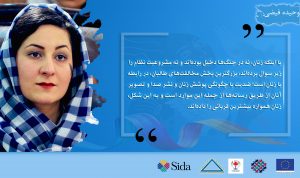When There is no Peace; I Changed My Name to Achieve My Dreams”

As a teenager with tremendous desire to work Wahida found herself living in a remote village dominated by the government’s armed opposition. Her neighbors not only discouraged girls who worked but also threatened them. She said that those challenges not only discouraged her to work but rather made her more determined.
Belonging to a family with political and military background, Wahida constantly faced objections for disgracing the reputation of the family by working out of home. Following Wahida’s persistence to work out of home, her family decides to leave their ancestor’s land and move to Kabul where she could achieve her goals.
While in Kabul she still feared her kin’s vengeance. Despite her young age and her relative’s disbelief in her, she moved forward with determination starting with participating in a short-term training course to work in media. She was so young that the person in charge of the training center jokingly said that you want to be trained for children programs? In her first experience on a live radio program, she avoided using her real name to the audience and used “Hila” as her pseudonym.
Wahida now called “Hila” worked as radio presenter for several years. In order to avoid financial dependency, she walked the distance between her school and the radio office. Upon her graduation from school, she decided to become a reporter. A media office in Kabul was running a training program for journalists those days. Wahida joined the program. After three months of training and mentorship, she became a journalist.
She joined a media outlet and worked for four years now using her real name. While she was preparing reports on corruption and war the victims, she received death threats. Nonetheless, Wahida continued her work and received a medal from the president for one of her reports on an educated young man addicted to consuming drugs. Wahida published several reports in the name of her colleagues, due to potential threats.
Wahida who is now in charge of the gender unit of Journalists Safety Committee, prefers the current situation – despite challenges in her working life – to the potential peace settlement. She is not very optimistic about outcome of the peace process. She believes that the peace deal will deprive many people of their rights. She added that when the Taliban ask for the segregation of boys and girls at the universities, clearly, they will object to women’s work especially those who work in the media. According to her, women have never been a part of the war nor have they undermined the legitimacy of the governments, but still they remain as the main victim between the two sides.
Ms. Wahida Faizi said that despite the existence of several peace-related government agencies including the State Ministry for Peace, and the High Peace Council, we witness no peace on the ground, signifying the symbolic status of these entities. An end to violence and conflict can be promising for reaching peace.
Referring to President’s comment on the second chapter of the Constitution as non-negotiable, she said that we hope president remains committed to his remarks about the second chapter of the constitution as the government’s red-line in the peace talks. Otherwise, we will advocate for those rights and will not surrender to compromises. The second chapter of the constitution deals with freedoms and human rights issues, which has always been one of the most controversial and unacceptable issues for the Taliban. According to her, a peace in which women are deprived of their right to work and life, which is an inalienable human rights, will never be accepted by women.